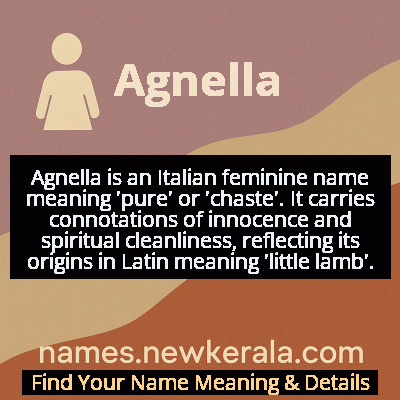Agnella Name Meaning & Details
Origin, Popularity, Numerology Analysis & Name Meaning of Agnella
Discover the origin, meaning, and cultural significance of the name AGNELLA. Delve into its historical roots and explore the lasting impact it has had on communities and traditions.
Name
Agnella
Gender
Female
Origin
Italian
Lucky Number
7
Meaning of the Name - Agnella
Agnella is an Italian feminine name meaning 'pure' or 'chaste'. It carries connotations of innocence and spiritual cleanliness, reflecting its origins in Latin meaning 'little lamb'.
Agnella - Complete Numerology Analysis
Your Numerology Number
Based on Pythagorean Numerology System
Ruling Planet
Neptune (Ketu)
Positive Nature
Intuitive, analytical, spiritual, and inquisitive.
Negative Traits
Secretive, reserved, aloof, and can be overly critical.
Lucky Colours
Green, yellow.
Lucky Days
Monday.
Lucky Stones
Cat’s eye, moonstone.
Harmony Numbers
1, 5, 6.
Best Suited Professions
Scientists, researchers, spiritual leaders, detectives.
What People Like About You
Depth of knowledge, analytical skills, spirituality.
Famous People Named Agnella
Agnella Segatori
Art Model and Café Owner
Famous model for Vincent van Gogh and other Parisian artists, proprietor of Café du Tambourin
Agnella Jacobucci
Religious Figure
Italian nun known for charitable work and community service in rural Italian communities
Agnella Lattanzi
Educator and Writer
Pioneering Italian educator who developed innovative teaching methods for early childhood education
Name Variations & International Equivalents
Click on blue names to explore their detailed meanings. Gray names with will be available soon.
Cultural & Historical Significance
The name flourished during the Renaissance period in Italy, where classical and religious names experienced a revival. In Southern Italian regions, particularly in Calabria and Sicily, Agnella became a traditional name passed through generations, often given to daughters born around the feast day of Saint Agnes (January 21st). The name embodies the Italian cultural values of family tradition, religious devotion, and the celebration of feminine virtue. While less common than its variant Agnese, Agnella maintains a distinctive charm that reflects Italy's rich linguistic and cultural heritage, serving as a testament to the enduring power of traditional names in modern Italian society.
Extended Personality Analysis
Women named Agnella are often perceived as possessing a gentle yet resilient character, combining traditional values with inner strength. They typically exhibit a calm and nurturing demeanor, with a natural inclination toward caring for others and maintaining harmonious relationships. Their 'pure' namesake meaning often translates into genuine authenticity in their interactions, as they tend to be straightforward and sincere in their approach to life. Many Agnellas demonstrate a strong moral compass and intuitive understanding of right and wrong, making them trusted confidantes and reliable friends.
Despite their gentle exterior, Agnellas frequently possess surprising inner fortitude and determination. When faced with challenges, they draw upon deep reserves of patience and perseverance rather than aggressive confrontation. They often excel in roles that require compassion and attention to detail, such as teaching, healthcare, or community service. Their combination of traditional wisdom and quiet confidence makes them natural peacemakers who can navigate complex social situations with grace. This balance of strength and gentleness allows Agnellas to maintain their core values while adapting to changing circumstances, creating a personality profile that is both timeless and remarkably suited to contemporary challenges.
Modern Usage & Popularity
In contemporary times, Agnella remains a relatively rare but cherished name, primarily used in Italy and among Italian diaspora communities. While it never reached the popularity of its more common variant Agnese, it has experienced a modest revival in recent years as parents seek distinctive traditional names with deep cultural roots. The name is particularly favored in Southern Italy and among families with strong regional ties to Calabria and Sicily, where it serves as a marker of cultural identity and family heritage. Modern usage often sees Agnella paired with more contemporary middle names, creating a balance between tradition and modernity that appeals to today's parents. The name's rarity adds to its appeal for those looking for a unique yet historically significant name that honors Italian heritage without being overly common, positioning it as a sophisticated choice for families valuing both tradition and individuality.
Symbolic & Spiritual Meanings
The name Agnella carries rich symbolic meaning centered around purity, innocence, and spiritual devotion. The 'little lamb' symbolism connects to both Christian imagery of Christ as the Lamb of God and broader cultural associations of lambs with gentleness, vulnerability, and new beginnings. This symbolism extends to represent unconditional love, selfless sacrifice, and the preservation of innocence in a complex world. The name also embodies the concept of spiritual transformation, as the lamb imagery suggests growth from vulnerability to strength while maintaining core values of compassion and integrity. In Italian cultural context, Agnella symbolizes the ideal of feminine grace combined with quiet resilience, representing the ability to maintain purity of heart while navigating life's challenges, and serving as a metaphor for the journey from innocence to wisdom through lived experience.

